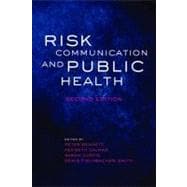
Note: Supplemental materials are not guaranteed with Rental or Used book purchases.
Purchase Benefits
What is included with this book?
| Risk, communication and the public understanding of uncertainty in public health | |
| Understanding public responses to risk | |
| Bringing light to the shadows and shadows to the light: risk, risk management and risk communication | |
| Consumer perceptions of the risks and benefits associated with food hazards | |
| The social amplification of risk framework (SARP): Theory, critiques and policy implications | |
| From trouble to trauma: the need for public-private health Partnerships | |
| Public health risk communication in practice | |
| The role of the media in public health crises: Perspectives from the UK and Europe | |
| Where do we go from here? The evacuation of city centres and the communication of public health risks from extreme threats | |
| Radiation in London: managing risk communication in the Litvinenko affair | |
| Risk Communication in the British Pertussis and MMR Vaccine Controversies | |
| Risk communication and pandemic influenza | |
| CJD: risk communication in a health care setting | |
| Contesting the science: public health knowledge and action in controversial land-use developments | |
| A Precautionary tale - the role of the precautionary principle in policy making for public health | |
| From the inside looking out, looking in - organisational issues around preparation and response for public health risks | |
| Changes to food risk management and communication | |
| Communicating across publics and between organisations: the case of childhood accidents | |
| Exporting Pandora's Box - Exploitation, risk communication and public health problems associated with the export of hazard | |
| Communication about persistent environmental risks: problems of knowledge exchange and potential of Participative techniques | |
| Geographical information systems as a means for communicating about public health | |
| Exploring and Communicating Risks: Scenario-based workshops | |
| Embedding better practice in risk communication and public health | |
| Table of Contents provided by Publisher. All Rights Reserved. |
The New copy of this book will include any supplemental materials advertised. Please check the title of the book to determine if it should include any access cards, study guides, lab manuals, CDs, etc.
The Used, Rental and eBook copies of this book are not guaranteed to include any supplemental materials. Typically, only the book itself is included. This is true even if the title states it includes any access cards, study guides, lab manuals, CDs, etc.